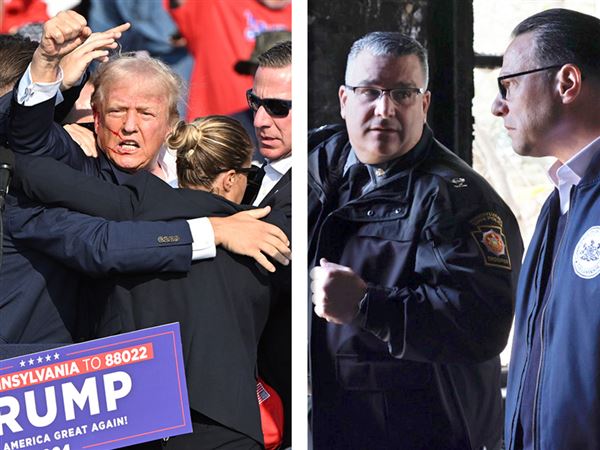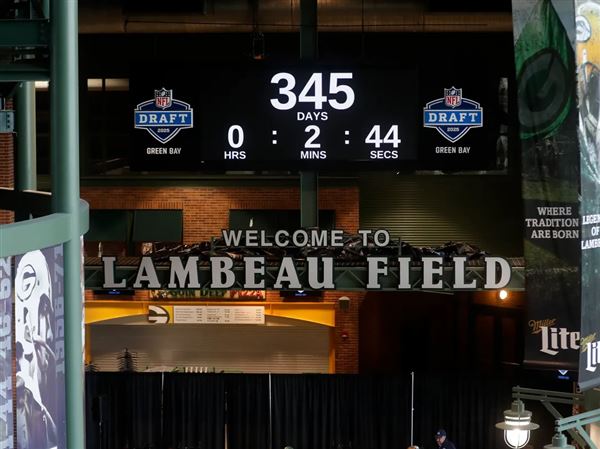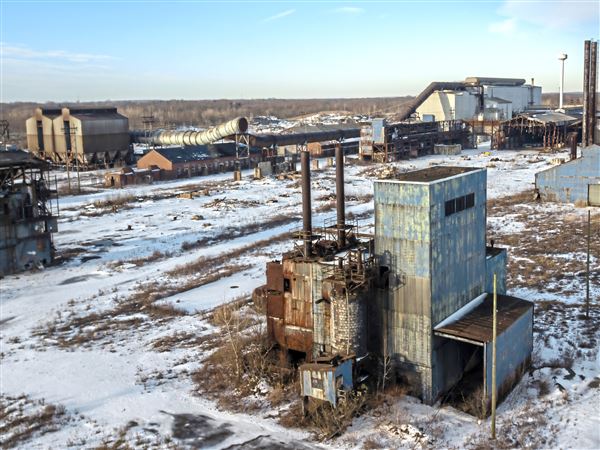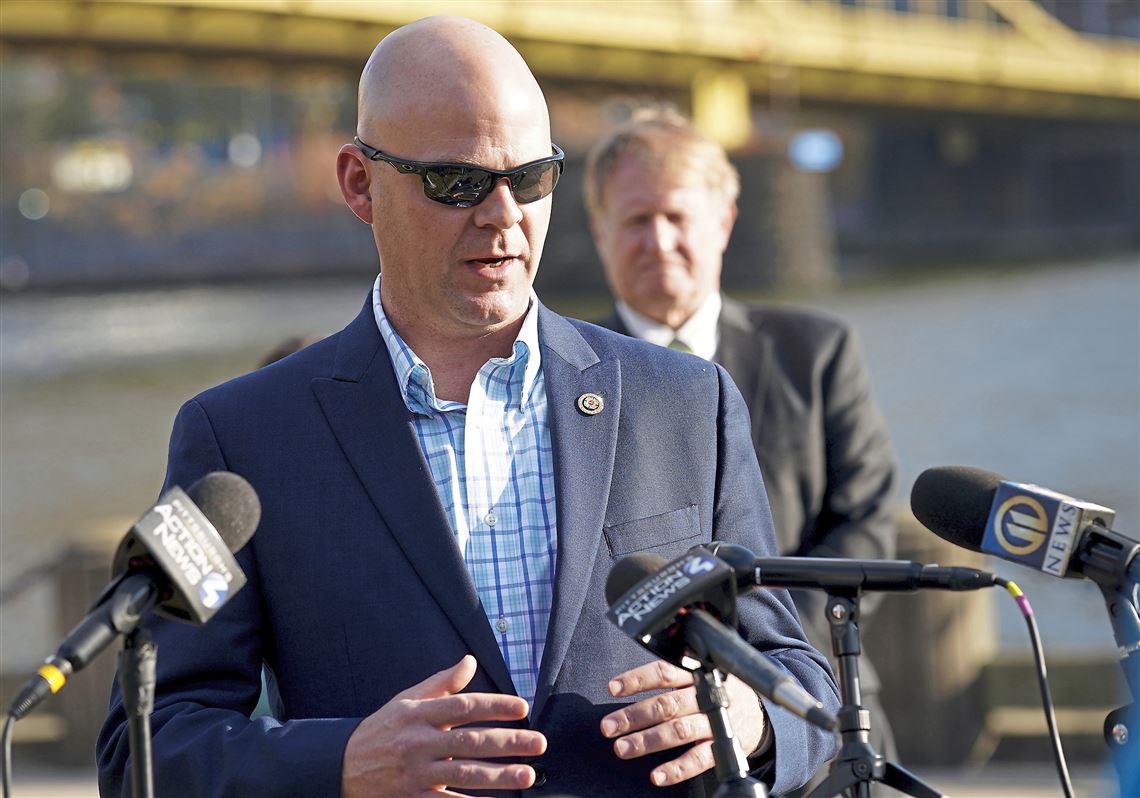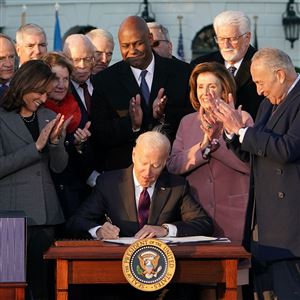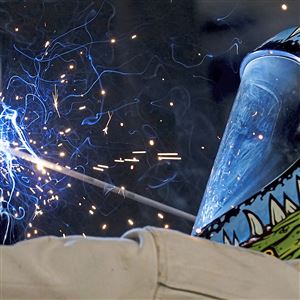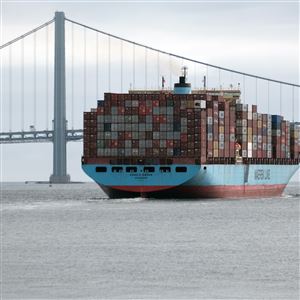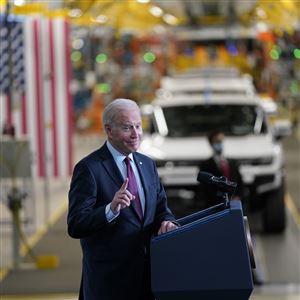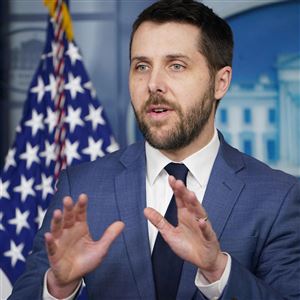The $1 trillion infusion into America’s roads, bridges and infrastructure — signed into law by President Joe Biden this week — will create about 40,000 union jobs in Allegheny County over the next few years, politicians and labor leaders said Wednesday.
Deeming Western Pennsylvania better positioned than any other region in the nation to benefit from the plan, labor leader Darrin Kelly said over the next decade, “we’re going to see job growth in this region that’s unprecedented.”
“People are going to have opportunity and employment that they never had before, not just in our construction field, but our energy field and our truck drivers,” Mr. Kelly, president of the Allegheny/Fayette Central Labor Council, said at a press conference Wednesday on the North Shore.
It’s a deal that Mr. Biden’s administration is selling as a comprehensive fix for the nation’s ailing infrastructure, meant to give Americans cleaner drinking water, high-speed internet and shift the economy away from fossil fuels. Allegheny County Executive Rich Fitzgerald said they’ve been waiting for such an investment for decades — and Mr. Biden made it happen.
But even though Democrats are taking a victory lap and the agreement ultimately won the support of 19 Republicans in the Senate, the spending package comes with its critics, including Western Pennsylvania’s two GOP Congressmen who voted against the bill in the House. U.S. Reps. Guy Reschenthaler, R-Peters, and Mike Kelly, R-Butler, said the $1 trillion investment goes far beyond the purpose of fixing physical infrastructure — and instead includes items from the Democrats’ wish list.
Either way, it’s an infusion of money that will long impact the region, officials say, a historic investment into roads, bridges, rail transit, ports, safe water, the power grid, broadband internet and more.
The estimate of 40,000 jobs in Allegheny County over the next few years comes from the White House, Mr. Kelly, the labor leader, said. He urged Western Pennsylvanians to think of the possibilities, and the fact that more than 1,300 abandoned mines and well sites need to be retrofitted and capped, hundreds of miles of broadband lines installed and thousands of miles of lead pipes removed.
Mr. Fitzgerald said it’ll put iron workers, carpenters, electricians, steamfitters and plumbers to work — making them a part of “building back America.” He said the money will jumpstart new projects and accelerate ones that have long been in the works, citing the need to repair the Parkway and the McKees Rocks Bridge, widen Bates Street and extend the busways.
“As county executive, I’ve had a lot of projects that I’ve had to say ‘no’ to over the years, knowing that the need is there, but the funding hasn’t been there to get it done,” Mr. Fitzgerald said. “We certainly can’t do this locally.”
Mr. Kelly, the Republican Congressman, said members only had hours to sift through more than 1,200 pages of legislation, and that while no one can argue that addressing true infrastructure issues is not needed right now, many pieces of the proposal have nothing to do with those needs. He took issue, for one, with the $7.5 billion toward building electric vehicle charging stations, something that if the market deemed necessary, it would have built itself, he said.
The Butler-area Republican said it’s his responsibility to ensure that when taxpayer funds are used, their return on investment is maximized.
“Let’s prioritize the most important things that will give us the best return on that investment,” Mr. Kelly said, citing the need to invest in roads, bridges, broadband, airports and river cleanup. “Every single penny comes out of the hardworking American taxpayer’s pocket. I think they should deserve a return on that investment.”
Celebrating the package, Pennsylvania State Sen. Lindsey Williams, a Democrat who represents the 38th district, said her office is routinely inundated with calls about infrastructure, from the lack of bus service up to the Allegheny Valley to concerns about landslides and flooding.
Ms. Williams, citing White House statistics, said the investment into Pennsylvania in particular — including $11.3 billion to improve highways, $1.6 billion for bridge replacement, $2.8 billion for public transit, $171 million for electric vehicle infrastructure and $100 million for broadband — will “make people’s lives better and put people to work.”
The Democratic state senator also talked of the potential impact to local economies from the influx of jobs. Think of what will happen when pipe fitters or steelworkers come to town to work, she said.
“They’re spending ... in our local economy. They’re going out to dinner. They’re going to the movies. They’re going to see a show at the Benedum,” Ms. Williams said.
Mr. Reschenthaler, a GOP Congressman who voted against the package, said it’s an infrastructure bill in name only — noting that it only invests $2.25 billion for all of America’s port infrastructure needs.
“Democrats ignored and short-changed much-needed investments in our nation’s real transportation needs, with less than half of new spending going towards traditional infrastructure,” Mr. Reschenthaler said in a statement, saying the bill puts billions into slush funds and “promotes crony capitalism to corporations by subsidizing [electric vehicle] charging stations.”
Mr. Fitzgerald said county officials don’t yet know when the money will come, nor “how quickly things can go out for bid and the shovels can go into the ground.” He did warn, tongue in cheek, that Allegheny County residents may see a lot of orange cones in the coming years and may get stuck in traffic every once in awhile as a result — a short term pain for a long term gain, he said.
Julian Routh: jrouth@post-gazette.com; Twitter: @julianrouth. The Associated Press contributed reporting.
First Published: November 17, 2021, 11:19 p.m.
